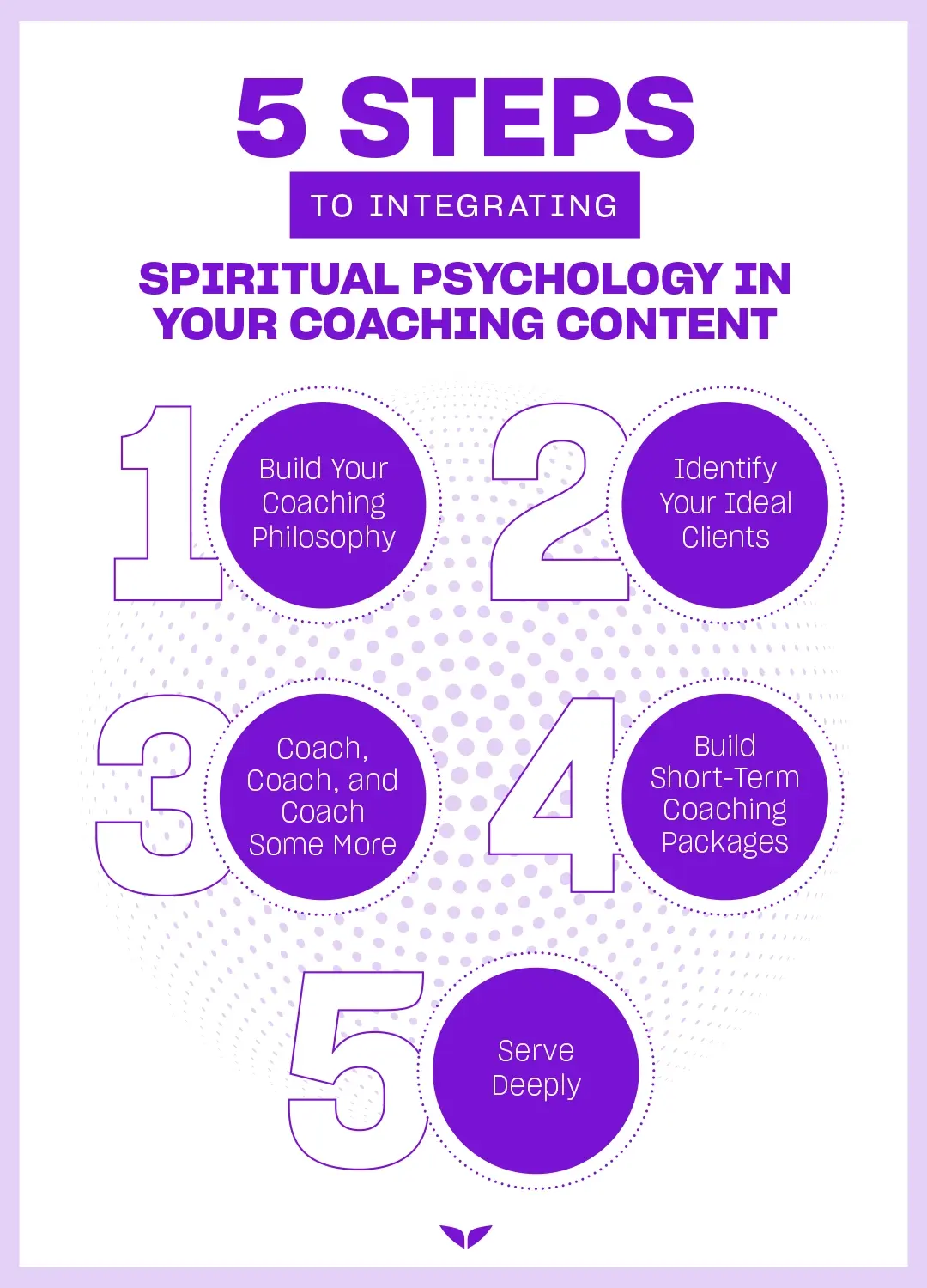Say you have a client who’s going through a challenging period in their life. No matter what they try, they’re not able to create breakthroughs or use any of the psychological tools to the greatest capacity.
Well, if that’s happening, maybe the missing piece is integrating spiritual psychology.
This is a concept that’s an evolving area. However, it can become one of the greatest strengths of any coach.
So when you ingrain your coaching practices with spiritual psychology, you may just find that you create transformation in your clients easier and faster.
What is spiritual psychology?
Spiritual psychology in coaching is an approach that integrates psychological principles with spiritual wisdom and practices. It acknowledges the interconnectedness of mind, body, and spirit.
This coaching modality often explores themes such as purpose, meaning, values, and mindfulness, fostering a holistic approach to well-being. Spiritual psychology encourages individuals to explore their beliefs, tap into their inner wisdom, and align their actions with their spiritual values.
Consider this…
As human beings, we have three different types of bodies. We have our physical bodies, of course. Then we have a psychological body, which most people are also aware of. And finally, we have our spiritual body.
Most coaching approaches tend to focus on the first two. However, the third is often ignored. That’s why, according to Ajit, the co-founder of Mindvalley Coach, using it in your coaching session can help your clients connect with their spiritual dimension and address challenges from a holistic perspective.
What are some of the different approaches to spiritual psychology?
The world of spiritual psychology is a diverse and vibrant one. Here are some approaches you may come across:
- Transpersonal psychology: spiritual development and other transcendent experiences
- Existential psychology: the individual’s search for meaning
- Humanistic psychology: an individual’s potential for self-actualization
There are other approaches that exist. Ultimately, the best one is the one that resonates most with your client’s individual needs and beliefs.
Why is spiritual psychology important?
The importance of spiritual psychology lies in its unique approach to understanding and fostering human well-being.
Because it integrates psychological practices with spirituality, it provides tools and practices for exploring your client’s inner world, uncovering hidden patterns, and fostering personal growth. Through techniques like meditation, mindfulness, and dream analysis, they can gain deeper insights into their motivations, strengths, and areas for improvement.
What’s more, spiritual psychology emphasizes the importance of connection and belonging. It encourages us to cultivate compassion, empathy, and forgiveness, fostering deeper and more meaningful relationships with others.
If you use spiritual psychology to create abundant breakthroughs in your clients, it may lead to a whole new dimension of possibilities. It helps them experience what it’s like to live a purposeful life, and, in certain cases, it may even lead to spiritual awakening.
5 steps to integrating spiritual psychology in your coaching
Spiritual psychology can help pave the way for a more meaningful and fulfilling existence for individuals and society as a whole. However, it’s important to note that not everyone will be open to this approach. So make sure your client is comfortable before diving into it.
Here’s how you can integrate spiritual psychology into your coaching:
1. Build your coaching philosophy
The first step to embracing spiritual psychology in your coaching is to build a solid coaching philosophy. It’s also the step that will likely take up the most time.
Research this field of coaching thoroughly. Read up on spiritual psychology facts and the experiences of successful master coaches who use them in their work. Attend some training sessions on the topic.
Once you become familiar with a few branches of spirituality, ask yourself:
- What is the coaching philosophy that I believe in?
- How will I integrate spirituality with psychology in my coaching sessions?
- What are the coaching tools and techniques I will use to apply my philosophy in my sessions?
2. Identify your ideal clients
It’s important to know your audience. Who are the people who will resonate with what you have to offer? Who are the people who will not be open to it?
Spiritual psychology is a relatively new dimension of coaching, so many people might not be able to grasp the concept. It might not make sense to them.
Have clarity on who your services are for and who won’t match your client profile.
3. Coach, coach, and coach some more
Embrace the unknown and the uncomfortable. Open your mind to a narrative that is beyond what can be cognitively explained.
Keep coaching, but try to go beyond mindset and psychology. Embrace the ebb and flow of spiritual energy while you are developing your spiritual psychology practices.
4. Build short-term coaching packages
You might find that people resist a long-term commitment to spiritual coaching. It’s because this is an unorthodox coaching methodology that can be uncertain and ambiguous to many.
Start with short-term coaching packages—something that is easier for your client to say yes to.
For example, you can try a 30-day engagement. Then, if your client sees the results, they will want to continue with you. When the commitment is short-term, your clients are more energized, and you will likely reach a way better outcome—sometimes in just one coaching session.
5. Serve deeply
The key to being successful with any type of coaching is to serve.
You are embarking on a new and profound coaching journey infused with spiritual psychology, so give it your best.
- Serve deeply: This will create the best impact.
- Serve consistently: This will give you the confidence to grow as a spiritual coach.
- Serve frequently: This will help you engage more and more people.

Make a change, create an impact
“While we have always been spiritual beings, how to really bring spirituality into coaching is a fairly new subject,” says Ajit. With that said, it’s a methodology that can create more profound breakthroughs in your clients and help them gain clarity in complex situations.
If you want to learn more about how to offer your clients transformative experiences, join the Become a Mindvalley Certified Life Coach masterclass—it’s for free.






